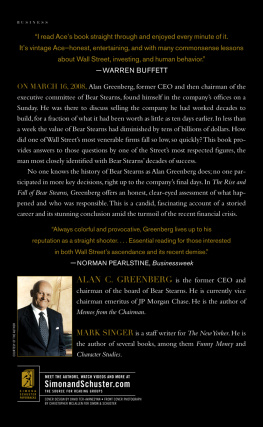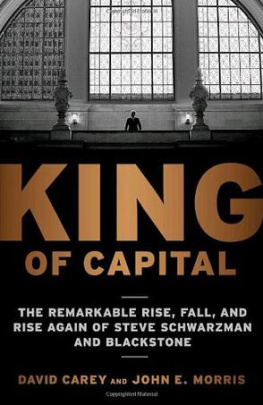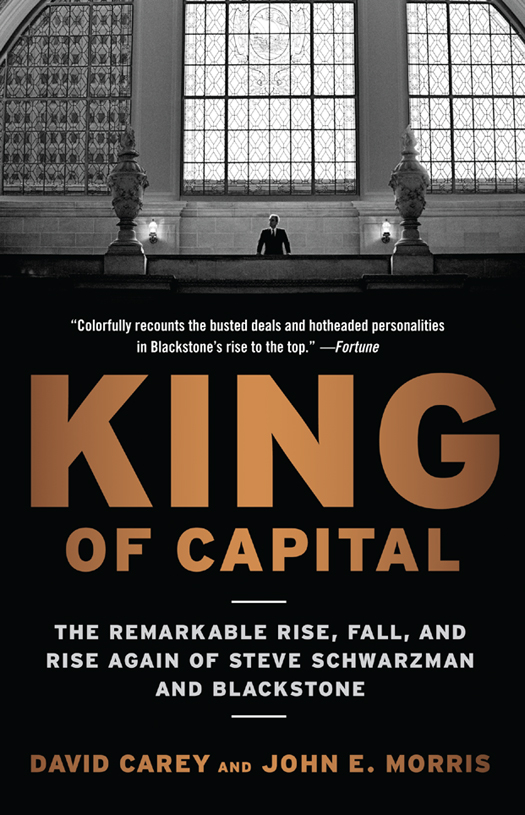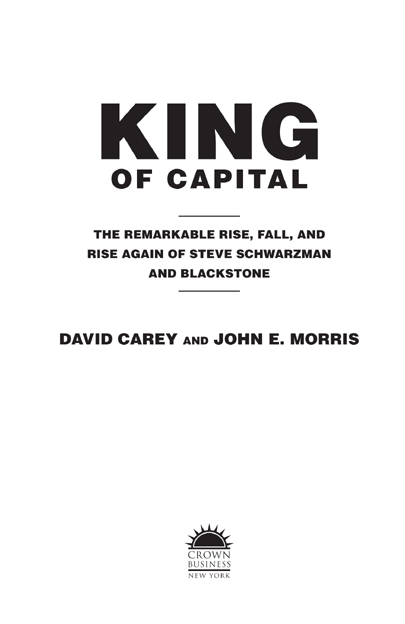Additional Praise for KING OF CAPITAL
The best nonfiction books about complicated, important subjects make the complexities understandable but also bring the lead characters to life. Whether explaining the origins of the leveraged buyout frenzy, unraveling the Byzantine corporate structure and personality-driven mini-dramas upon which Blackstone was built, narrating the ins and outs and ups and downs of dozens of Blackstones celebrated deals, or introducing us to an absentminded Pete Peterson walking around with Post-it notes on his lapels, David Carey and John Morris do that and more. This book is as important as it is fun to read.
Steve Brill, founder of Court TV and The American Lawyer,
author of The Teamsters and After, and co-CEO of Press+
A great strength of American capital markets is their extraordinary ability to positively innovate. The rise of private equity firms is a powerful example of this phenomenon. David Carey and John Morris tell the tale of Blackstone and the world of private equity with verve and perceptive insight.
Steve Forbes
An easy read with great insight into the world of private equity.
James M. Kilts, former chairman and CEO of the Gillette
Company and founding partner of Centerview Partners
King of Capital is at the same time informative, insightful, and entertaining. Carey and Morris provide an eye-opening history of buyouts and private equity that explains how and why the private-equity industry has evolved. They provide an unusually balanced (for nonacademics) treatment of the effects of private equity that conveys the essence of the academic research. And, of course, they do all of this while capturing the fascinating escapades and personality of Steve Schwarzman and Blackstone.
Steven N. Kaplan, Neubauer Family Professor of
Entrepreneurship and Finance, University of Chicago
Booth School of Business
The story of the private-equity industry over the past two-plus decades has been inexorably linked with the story of Blackstone. This well-written book goes beyond the personalities and the war stories to provide a fascinating look at the evolution of the group and the industry.
Josh Lerner, Jacob H. Schiff Professor of Investment Banking,
Harvard Business School
King of Capital aspires to be a serious portrait of Blackstone and the way that Schwarzman so brilliantly built it up, scoring numerous coups along the way and avoiding the mistakes of many competitors. And it does a fine job in what it sets out to do.
Henry Sender, Financial Times
The authors [take] us from the early days of the Blackstone Group, when the firm was just two guys and a secretary, to the buyout boom, when Mr. Schwarzmans conspicuous consumption became a symbol of the new Gilded Age. In between, the book dives deeply into the firms signature deals Celanese! Nalco! Distressed cable bonds! that made Mr. Schwarzman and his partners so rich. It also delivers some fun details about many of the now-famous Wall Street players that did tours of duty at the firm.
New York Times DealBook
Compelling.
National Post
[A] broad history of private equity, with Blackstone as the touchstone.
Fortune.com
Check out King of Capital because its got gossip, its got brains, and its as readable as hell. And its got some really good Schwarzman stories too.
The Deal
The authors link Blackstones history to the larger story of private equitys expansion and its relationship to corporate America. They offer a lucid explanation of how the debt markets evolved from junk bonds to securitized loans, changing the types of deals that private-equity firms were able to finance.
The Economist
Copyright 2010, 2012 by David Carey and John E. Morris
All rights reserved.
Published in the United States by Crown Business, an imprint of the Crown Publishing Group, a division of Random House, Inc., New York.
www.crownpublishing.com
CROWN BUSINESS is a trademark and CROWN and the Rising Sun colophon are registered trademarks of Random House, Inc.
Originally published as a hardcover in the United States by Crown Business, an imprint of the Crown Publishing Group, a division of Random House, Inc., New York, in 2010.
Library of Congress Cataloging-in-Publication Data
Carey, David (David Leonard), 1952
King of capital / David Carey and John E. Morris. 1st ed.
p. cm.
1. Blackstone Group. 2. Private equity. 3. Consolidation and merger of corporations. 4. Leveraged buyouts. 5. Financial services industryUnited States.
6. Investment advisorsUnited States. I. Morris, John E., 1957 II. Title.
HG4571.C37 2010
338.83dc22
2010018286
eISBN: 978-0-307-45301-3
Cover design: Pete Garceau
Cover photography: Gabe Palmer/Alamy
v3.1
Dedicated to our parents, Robert B. and Elizabeth S. Morris
and Miriam Carey Berry, and to the memory of
Leonard A. Carey
CONTENTS
PREFACE TO THE
NEW EDITION
L ike a play with one act remaining, the plot lines in private equitys saga were unresolved in 2010. The industry appeared to be on the mend but the future was murky.
A year later, it is plain that the buyout business has survived this economic bust just as it had several prior ones. When we finalized the hardback edition of King of Capital, buyout activity was downright anemic, and many of the big-ticket investments that private equity players had splurged on from 2005 to 2007at the top of the marketwere in sorry shape. Since then, things have taken a sharp turn for the better, thanks to a recovering economy and ultralow interest rates, which have buoyed corporate earnings and the values of private equity investments. Most, but not all, of the inventory of mid-decade megadeals are now well above waterthe investments worth at least what was paid for them. New buyouts are being minted. Blackstone Groups stock, which hit a low of $3.55 in February 2009, bounced back to nearly $20 at one point in early 2011.
Over that year, several of the key themes that emerged as we traced the history of Blackstone and of leveraged buyouts have also become even more manifest. Most significantly, the drive by the elite private equity houses to diversify away from buyouts and to go public has gained speed. The slump that socked them with heavy losses has turbocharged such efforts, which are alteringeven reinventingthe industrys business model.
In this edition, we have recast the conclusion, Blackstone investments in the penultimate chapter as well as some of the statistics there. We have also made minor revisions and corrections elsewhere.
October 2011
CHAPTER 1
The Debutants
M ore Rumors About His Party Than About His Deals, blared the front-page headline in the New York Times in late January 2007. It was a curtain-raiser for what was shaping up to be the social event of the season, if not the era. By then, the buzz had been building for weeks.
Stephen Schwarzman, cofounder of the Blackstone Group, the worlds largest private equity firm, was about to turn sixty and was planning a fte. The financiers lavish holiday parties were already well known in Manhattans moneyed circles. One year Schwarzman and his wife decorated their twenty-four-room, two-floor spread in Park Avenues toniest apartment building to resemble Schwarzmans favorite spot in St. Tropez, near their summer home on the French Riviera. For his birthday, he decided to top that, taking over the Park Avenue Armory, a fortified brick edifice that occupies a full square block amid the metropoliss most expensive addresses.









